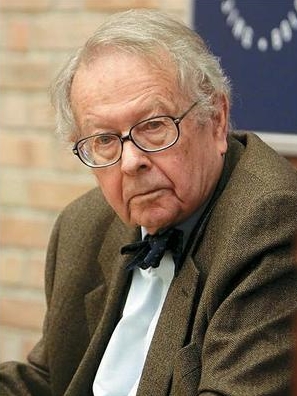Источник: Man, the State, and War (1959), Chapter VII, Some Implications Of The Third Image, p. 188
Уолтц, Кеннет Нил: Цитаты на английском языке
“Once socialism replaces capitalism, reason will determine the policies of states.”
Источник: Man, the State, and War (1959), Chapter V, Some Implications Of The Second Image, p. 150
Источник: Man, the State, and War (1959), Chapter IV, The Second Image, p. 81
“War may achieve a redistribution of resources, but labor, not war, creates wealth.”
Источник: Man, the State, and War (1959), Chapter VIII, Conclusion, p. 224
Источник: Man, the State, and War (1959), Chapter II, The First Image, p. 16
“Each man does seek his own interest, but, unfortunately, not according to the dictates of reason.”
Источник: Man, the State, and War (1959), Chapter II, The First Image, p. 23
“No system of balance functions automatically.”
Источник: Man, the State, and War (1959), Chapter VII, Some Implications Of The Third Image, p. 210
Источник: Man, the State, and War (1959), Chapter VI, The Third Image, p. 186
Источник: Man, the State, and War (1959), Chapter III, Some Implications Of The First Image, p. 69
“In anarchy there is no automatic harmony.”
Источник: Man, the State, and War (1959), Chapter VI, The Third Image, p. 160
Источник: Man, the State, and War (1959), Chapter V, Some Implications Of The Second Image, p. 127
Источник: Man, the State, and War (1959), Chapter VII, Some Implications Of The Third Image, p. 204
Источник: Man, the State, and War (1959), Chapter III, Some Implications Of The First Image, p. 42
Источник: Man, the State, and War (1959), Chapter VI, The Third Image, p. 159
“To build a theory of international relations on accidents of geography and history is dangerous.”
Источник: Man, the State, and War (1959), Chapter IV, The Second Image, p. 107
Источник: Man, the State, and War (1959), Chapter VI, The Third Image, p. 163
Источник: Theory of International Politics (1979), p. 110
“In a zero-sum game, the problem is entirely one of distribution, not at all one of production.”
Источник: Man, the State, and War (1959), Chapter VII, Some Implications Of The Third Image, p. 202
Источник: Man, the State, and War (1959), Chapter VIII, Conclusion, p. 238
Источник: Man, the State, and War (1959), Chapter VIII, Conclusion, p. 230
Источник: Theory of International Politics (1979), p. 4
“External pressure seems to produce internal unity.”
Источник: Man, the State, and War (1959), Chapter V, Some Implications Of The Second Image, p. 149
Источник: Man, the State, and War (1959), Chapter IV, The Second Image, p. 98
Источник: Man, the State, and War (1959), Chapter II, The First Image, p. 38
Источник: Theory of International Politics (1979), p. 137
Источник: Man, the State, and War (1959), Chapter I, Introduction, p. 1
